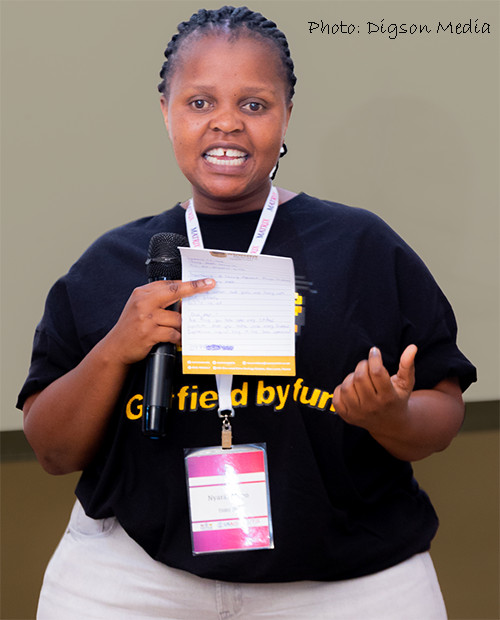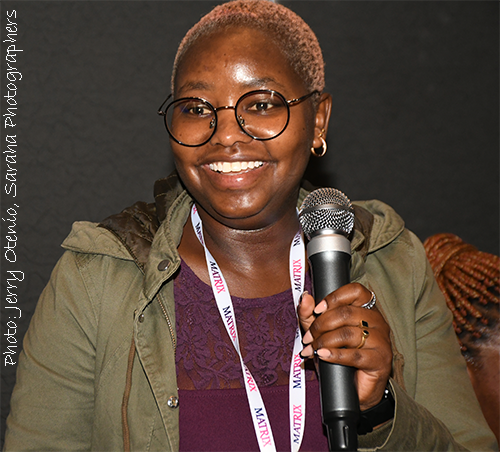How having a seat at the table had one young African woman feeling like “a leader” and another “very smart”
MATRIX stakeholder consultations about HIV prevention products in early development were empowering to young women
In the room were high ranking officials from the national Ministry of Health and the Medicines Control Authority, seasoned advocates, program directors, doctors, and nurses. There was also Nyarai Moyo, a 32-year-old mother of two boys, ages 8 and 11, who works as a cashier at a service station, typically the 6 am to 8 pm shift. In 2017, she had participated in the QUATRO study, which evaluated young women’s preferences for four vaginally inserted placebo HIV prevention methods.

Nyarai was among some 60 stakeholders in Zimbabwe who had been invited to a two-day meeting in October of last year to hear about MATRIX: A United States Agency for International Development (USAID)-funded project to advance the early research and development of innovate HIV prevention products for women, including products being designed to prevent both HIV and pregnancy. Researchers wanted to know what stakeholders had to say about the products being developed under MATRIX, including whether these were products that women would likely use if they were ever to become available.
The discussion during those two days was focused on six of nine products in the MATRIX pipeline. Only one had ever been evaluated in a clinical trial – a small Phase 1 study that had taken place in the United States. The rest were still being tested in the laboratory and animals. Products this early in their development have a long way to go. If and once a product is considered ready for testing in humans, it can take seven or more years to complete the Phase 1, 2 and 3 trials required for demonstrating a product’s safety and effectiveness. And there’s no guarantee for success. Of some 25-50 promising drugs against HIV, perhaps five might advance to the clinical trials stage, and only one might actually be approved. But what if it’s a product that women aren’t keen on using or that’s too expensive or impractical to introduce? Indeed, a key feature of MATRIX is its focus on being responsive to the needs and desires of end-users and stakeholders during the earliest stages of a product’s development, because safety and effectiveness aren’t the only factors that should be considered. Products must also be acceptable, affordable, scalable and deliverable in the settings where they are needed most.
Initially, Nyarai wondered why she had been invited to a meeting with so many important people. As it turns out it was she – and the other young women in attendance –who were the important ones, whose opinions mattered most. “At first, I was nervous,” she admits, but after being handed the microphone a second time and then a third, she said she “felt like a leader” and empowered, counting herself among those “who are going to make a difference and bring change so that we can witness an HIV-free generation of women.”

For Jerop Limo, the stakeholder consultation in Kenya wasn’t the first time interacting with policy makers and researchers. Though she had only just turned 23, she’d already seen and done a lot. A university student studying community development and social services, she is also executive director of an organization called Ambassador for Youth and Reproductive Health that advocates for the sexual and reproductive health rights and needs of adolescents and young people living with HIV.
Compared to the other stakeholder meetings she’s attended, this one “was very, very different, and in a good way,” in part, she explains, because “we were being engaged at the beginning …. We’re talking about a product in the lab, the product isn’t even ready. We’re talking about the first process of research…and for us adolescent girls and young women, that meant a lot, and to me as an individual – that a Kenyan girl will participate in this process! The opportunity to be enlightened, to participate and to share our voice. Whew.”
“I’m very, very grateful to have had that opportunity, because I left there feeling very smart.”
MATRIX held three in-country stakeholder consultations in 2022, its first year of funding. The other was in South Africa. The feedback garnered from these meetings has since been shared with the product developers, and some changes have been made as a result, including modifying the shape of the vaginal film (to make the corners rounder) and the design of the MATRIX-002 study. MATRIX-002 will be evaluating the acceptability of two monthly placebo vaginal films – the original square version and the one with rounder corners – the results of which will determine which film advances to a first-in-human study of a monthly film containing the antiretroviral drug dapivirine. (Stay tuned for the full story!!)
Meanwhile, if you’d like to know what else Nyarai, Jerop and other stakeholders had to say, please take a look at the final stakeholder consultations report.
